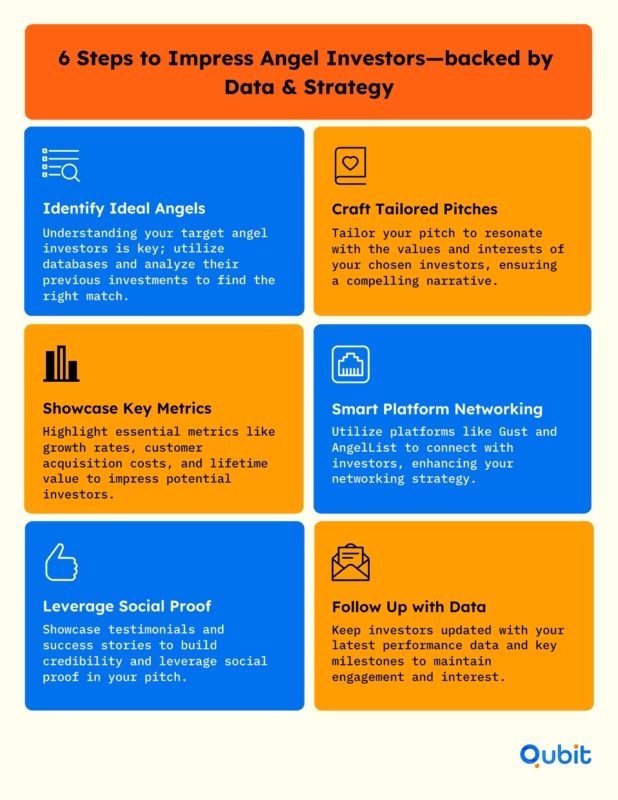Securing funding is often a major challenge for startups. Angel investors can play a key role in turning ideas into successful businesses. These private backers not only provide capital but also bring valuable expertise and networks to the table. Understanding what are angel investors is essential to grasp their impact on startup growth.
Investors spend an average of 3 minutes and 44 seconds looking at pitch decks before making initial decisions. This highlights the need for a concise and impactful presentation.
This blog dives into practical strategies designed to help startups attract angel investors effectively. From refining your pitch to using analytics, we’ll cover everything you need to know. Let’s jump right in!
How to Prepare and Consolidate Data to Attract Angel Investors
Attracting angel investors requires more than just a compelling idea. It demands a well-structured presentation backed by accurate and consolidated data. Startups often face the challenge of gathering insights from diverse sources. However, streamlining this information is essential to refine pitch strategies and improve investor outreach.
Why Data Consolidation Matters
Data consolidation involves integrating information from various sources into a unified format. For startups, this means combining financial metrics, market analysis, customer insights, and operational data into a cohesive narrative. A clear and organized dataset not only demonstrates professionalism but also helps investors assess the viability of your business.
For example, presenting fragmented data can confuse potential investors, while consolidated insights allow them to see the bigger picture. This approach ensures that your pitch is both persuasive and easy to understand, increasing the likelihood of securing funding.
Tools to Streamline Data Integration
To consolidate data effectively, startups can utilize analytical tools designed to simplify complex datasets. These tools help organize information, identify trends, and create visual representations that resonate with investors.
- Customer Relationship Management (CRM) Software: CRM platforms can centralize customer data, providing insights into user behavior and retention rates.
- Financial Analysis Tools: Applications like QuickBooks or Xero streamline financial reporting. They ensure accuracy in profit margins, expenses, and revenue projections.
- Market Research Platforms: Tools such as Statista or Nielsen can offer valuable market insights, helping startups position their offerings effectively.
- Data Visualization Tools: Platforms like Tableau or Power BI help turn consolidated data into clear, impactful charts and dashboards for investor presentations.
- Collaboration & Project Management Tools: Solutions like Notion or Asana keep team inputs and updates in one place, ensuring your data remains current and accessible.
By integrating these tools, startups can present data in a way that aligns with investor expectations, making their pitch more impactful.
Refining Pitch Strategies with Data
Consolidated data forms the backbone of a strong pitch. Startups can draw on it to spotlight key performance indicators, show market demand, and outline growth potential.
Aligning your pitch with insights drawn from solid data lets you address investor concerns and highlight your strengths. Converting syndicate chatter into wires starts with proving what angels expect to see, clear traction, crisp unit economics, credible plan.
Key Benefits of Consolidated Data
- Improved Decision-Making: Unified data enables startups to identify strengths and weaknesses, guiding strategic decisions.
- Enhanced Investor Confidence: A well-organized dataset demonstrates transparency and professionalism, building trust with potential investors.
- Streamlined Communication: Consolidated insights make it easier to articulate your business model and growth potential during pitches.
- Improved Risk Assessment: Centralized metrics help you spot potential pitfalls early and plan mitigation strategies before investor discussions.
- Accelerated Pitch Preparation: With all data in one place, updating and iterating your pitch deck becomes faster, ensuring you present the latest figures and trends.
By focusing on data consolidation, startups can transform scattered information into a powerful tool for attracting angel investors. Seeing where angel capital sits within the broader list of types of startup funding helps you match each outreach effort to the investors most likely to respond.
How to Spot Data Patterns and Trends to Attract Angel Investors
Identifying recurring data patterns and emerging trends is essential for startups seeking angel investment. By analyzing operational metrics, understanding investor preferences, and utilizing advanced analytics, businesses can refine their strategies to attract funding effectively.
Recognizing Consistent Pitch Strategies
Successful pitch strategies often share common elements that resonate with angel investors. A well-structured pitch deck, for instance, can highlight key operational metrics and growth potential. Consistency in presenting traction metrics, customer acquisition costs, and projected ROI builds investor confidence. Tools like Tableau specialize in data visualizations, making these metrics more digestible and impactful during presentations.
Operational Metrics That Drive Engagement
Operational efficiency and measurable growth are critical factors for angel investors. Case studies demonstrate how startups can leverage data to improve their operations and attract funding. For example, the Lufthansa case study reveals how the airline saved 30% of data preparation time, showcasing the direct impact of operational enhancements on strategic agility.
Additionally, highlighting market timing can position startups as timely opportunities. The Retail E-Commerce Market Report forecasts a CAGR of 11.6% from 2024 to 2030 in the global retail e-commerce market, underscoring broader market tailwinds.
Advanced Analytics: A Game-Changer
The integration of advanced analytics has transformed how startups approach angel investors. Predictive tools like Fathom assist in forecasting cash flow and ROI, helping founders build more credible financial models. Furthermore, AI-driven analytics platforms such as Anodot enable real-time anomaly detection and forecasting, offering deeper insights into market trends and customer behavior.
Real-Time Data Processing
Another emerging trend is leveraging real-time data streams. By integrating platforms like Apache Kafka, startups can process and analyze data on the fly, demonstrating their ability to pivot quickly in response to market shifts.
Networking and Investor Preferences
Building relationships with angel investors often requires strategic networking and a data-driven narrative. By focusing on consistent pitch strategies, operational metrics backed by real case studies, and advanced analytics tools, with direct links to the original reports and resources, startups can create a compelling story that resonates with investors’ desire for evidence-based decision-making.
Actionable Strategies to Help You Attract Angel Investors
Securing angel investment requires more than a compelling pitch; it demands strategic preparation and execution. Typically, startups need to conduct 40 quality investor meetings to close a funding deal. This highlights the importance of persistence and strategic engagement.

1. Utilize Data to Identify Ideal Angel Investors
Understanding the preferences and investment patterns of potential angel investors is crucial. Startups can analyze publicly available data, such as investment portfolios and industry focus, to pinpoint investors who align with their vision. For instance, a tech startup specializing in AI solutions might prioritize investors with a history of funding AI-driven ventures.
By leveraging tools like investor databases and analytics platforms, startups can refine their outreach, ensuring they approach investors who are most likely to resonate with their business model. This targeted approach not only saves time but also increases the likelihood of securing funding.
2. Craft Tailored Pitches Using Insights
A generic pitch rarely captures an investor’s attention. Instead, startups should use data to personalize their presentations. For example, if an investor has previously funded eco-friendly initiatives, highlighting your startup’s sustainability efforts can create a stronger connection.
Tailored pitches demonstrate that you’ve done your homework, showcasing your commitment to aligning with the investor’s values and interests. This strategy has proven effective for startups that secured funding after customizing their presentations to address specific investor priorities.
3. Showcase Metrics That Matter
Angel investors often look for tangible evidence of a startup’s potential. Presenting key metrics—such as customer acquisition rates, revenue growth, or market demand—can make your case more compelling. For instance, a startup in the e-commerce space might highlight its monthly sales growth and customer retention rates to demonstrate scalability.
Data-driven insights not only validate your claims but also instill confidence in investors, showing that your business is grounded in measurable success.
4. Build Relationships Through Strategic Platforms
Connecting with angel investors requires more than cold outreach. Startups can use specialized platforms to establish meaningful relationships. A concise evaluation in platforms to find angel investors outlines various online venues for connecting with investors, aligning with the strategic insights presented in this guide. These platforms enable startups to network effectively, fostering trust and credibility before pitching their ideas.
By engaging with investors on platforms tailored to startup funding, businesses can position themselves as proactive and professional, increasing their chances of securing investment.
5. Leverage Success Stories to Build Credibility
Sharing case studies or testimonials from previous investors can significantly boost your credibility. For example, if your startup has already received funding from a notable angel investor, highlighting this achievement can reassure potential investors of your viability.
Success stories serve as social proof, demonstrating that your business has the potential to deliver returns. This strategy has been successfully employed by startups across industries, helping them attract additional funding.
6. Optimize Follow-Up Strategies
Persistence is key when engaging with angel investors. Startups should use data to track interactions and plan follow-ups strategically. For instance, if an investor expressed interest but hasn’t committed, sending a follow-up email with updated metrics or new developments can reignite their interest.
Effective follow-up strategies ensure that your startup remains top-of-mind, increasing the likelihood of securing investment.
Final Thoughts
By implementing these actionable strategies, startups can transform their approach to angel investor engagement, ensuring their funding efforts are both strategic and impactful. From identifying ideal investors to crafting tailored pitches, every step plays a crucial role in optimizing the funding journey.
Conclusion
Crafting a compelling pitch deck is more than just assembling slides; it’s about telling a story that resonates with potential investors. 31-40% annual returns are what most experienced angel investors expect on early stage investments, making it crucial to highlight potential returns in your pitch.
The importance of a well-structured pitch deck cannot be overstated—it’s often the first impression investors have of your business. Incorporating advanced analytics and actionable steps ensures your presentation stands out in a competitive landscape.
If you’re ready to elevate your pitch, our Pitch Deck Creation service at Qubit Capital is here to help. Let us transform your startup’s vision into a story that captivates and attracts the right investors.
Key Takeaways
Consolidating insights from multiple data sources—including industry databases, investor profiles, and funding trends—is essential for building a targeted, effective angel investor outreach strategy.
Recognizing and leveraging emerging data patterns, such as the use of AI-driven analytics, can enhance due diligence and boost investor confidence in your startup’s growth potential.
Real-world examples and practical use cases demonstrate proven tactics for identifying, approaching, and converting the right investors, offering founders repeatable outreach frameworks.
A compelling pitch deck, anchored by a clear and cohesive narrative, is fundamental for capturing attention and differentiating your startup in a competitive investment landscape.
- Tailored investor outreach and strategic follow-up—using up-to-date metrics and personalized insights—keep your startup top-of-mind and significantly improve conversion rates.
Frequently asked Questions
What is the best way to find and attract angel investors?
To find and attract angel investors, attend industry-specific networking events, use online platforms like AngelList, and ensure your pitch deck is polished and compelling. Highlight potential returns, as most experienced angel investors expect 31-40% annual returns on early-stage investments.






